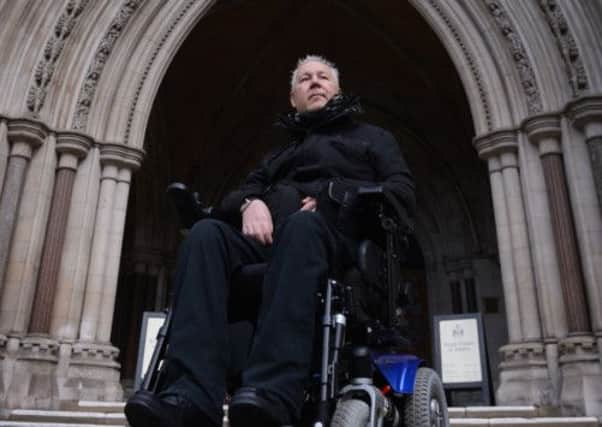Disabled father of two demands legal right to die


Paralysed Yorkshire father Paul Lamb is among those bringing a legal challenge to a ruling against assisted death.
The case was originally started by locked-in syndrome sufferer Tony Nicklinson, who died at home in Wiltshire a week after he lost his High Court bid last August to end his life with a doctor’s help. He had refused food and water and contracted pneumonia.
Advertisement
Hide AdAdvertisement
Hide AdMr Nicklinson’s wife Jane is continuing his battle, with 57-year-old Mr Lamb having won the right to join the litigation.
Judges are also hearing a challenge from another man with locked-in syndrome, known as “Martin”, whose case was rejected on the same day as Mr Nicklinson’s.
Yesterday the court in London was told by Paul Bowen, who represents Mrs Nicklinson and Mr Lamb, that though many people lived with debilitating conditions, some wanted to be able to choose not to continue with their life.
“They have formed a competent and settled wish to end their lives, but are too sick or disabled to do so without assistance,” the QC said. “As the law currently stands they must suffer in silence or make desperate attempts to kill themselves because any person who assists them – particularly any medical professional – faces prosecution and imprisonment for doing so, either for assisted suicide or murder.”
Advertisement
Hide AdAdvertisement
Hide AdMr Lamb, from Bramley, Leeds, was left disabled by a road accident in 1990. The divorced father-of-two is immobile except for limited movement in his right hand and is in significant pain. The former builder and father of two wants a doctor to help him die in a dignified way, preferably by a lethal injection, with his family around him in his own home.
Outside court, he said he wanted a change in the law so he could call upon help to die if he wished.
But he added: “Having said that, if it were sat there [the option of being helped to die] it would give me peace of mind enough to prolong my life, actually. Otherwise I am constantly looking, if I want a way out, how on earth can I do it, without getting someone into trouble and I don’t want to get anyone into trouble. I just want my wishes to be respected.”
Mr Bowen told the three leading judges considering the case that Mr Lamb requires constant care.
Advertisement
Hide AdAdvertisement
Hide Ad“He spends the whole of every day in his wheelchair. He experiences a significant amount of pain and has done ever since the accident, with the consequence that he is constantly on morphine. He feels that he is trapped in his body, that he cannot enjoy or endure a life that is so monotonous and painful and lacking in autonomy.”
The court heard that Martin suffered a massive stroke in August 2008 which left him unable to speak and virtually unable to move, and wants to be allowed a “dignified suicide”. In written argument, Philip Havers QC, for Martin, told the judges he “has never asked the courts to decriminalise assisted suicide”, but sought clarity about how discretion over prosecutions would be applied.
“Martin loves his family, enjoys spending time with them, and likes to read,” he said. “But he finds his life and his condition following his stroke to be undignified, distressing and intolerable. He is not going to recover, and does not want to continue living like this. He wants to die.”
David Perry QC, for the Ministry of Justice, said in written submissions it was for Parliament to decide on the existing legal framework “reflecting social and moral policy”. It was then for the courts to apply that legal framework to a particular case.
Advertisement
Hide AdAdvertisement
Hide AdAt the outset of the proceedings, the judges made it clear they were “acutely aware of the desperate situation” of those at the centre of the litigation – but emphasised the case could not be decided on the basis of “personal sympathy”.
Lord Judge stressed it had to be decided on the “basis of principles of law” after the court has heard all sides.
The hearing continues.